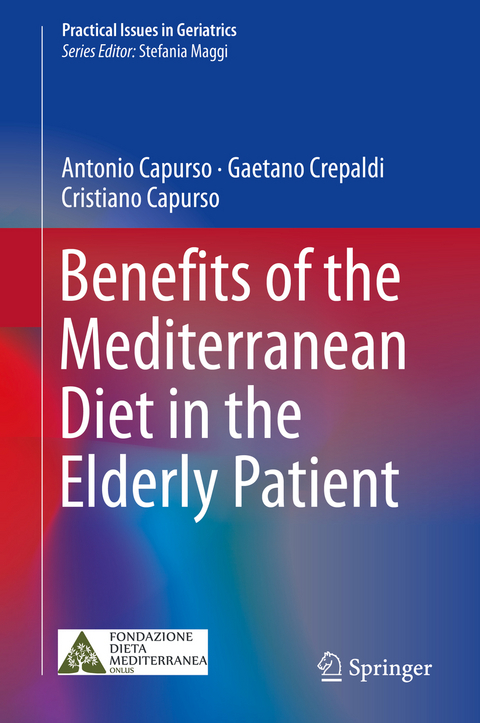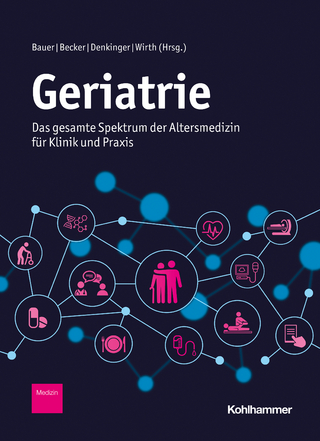
Benefits of the Mediterranean Diet in the Elderly Patient
Springer International Publishing (Verlag)
978-3-319-78083-2 (ISBN)
This book illustrates the role of Mediterranean diet in connection with well-being and particularly its impact on health and elderly care, as well as on the mechanisms of aging.
Aging is a natural process of human life. The knowledge that a healthy dietary regimen like the Mediterranean diet can effectively prevent or delay many diseases typically affecting aging people may help to better manage the aging process. From this point of view, knowledge of the numerous benefits of the Mediterranean-style diet may effectively promote better management of the burden of elderly care.
As early as the 1950s, Ancel Keys pointed out the effectiveness of the Mediterranean diet in helping to control, and possibly avoid, myocardial infarction and/or cholesterol metabolism. Quite soon after the first studies were published, it became clear that the Mediterranean diet was beneficial not only in connection with cardiovascular disease but also many other diseases, from diabetesto hypertension, from cancer and thrombosis to neurodegenerative diseases, including dementia.
Examining those benefits in detail, this book offers a valuable educational tool for young professionals and caregivers, as well as for students and trainees in Geriatrics and Nutrition.
Antonio Capurso was born in Monopoli, Italy, in 1937. After graduating in Medicine at the University of Bari in July 1962, he worked at the Faculty of Medicine of the University of Bari, first as Assistant Professor from 1963 to 1984, then as Associate Professor in Internal Medicine from 1984 to 1986 and finally as Full Professor of Internal Medicine and Geriatrics from 1986 on. Between 1967 and 1995 he engaged in research stays at various European universities (Germany, the UK). From 1986 to 2009 Prof. Capurso was Director of the postgraduate School of Geriatrics at the University of Bari, and an official member of the EUGMS Committee (European Union Geriatric Medicine Society) as Italian delegate from 1996 to 2008. He retired from University in November 2009. Prof. Capurso has authored more than 250 papers in national and international journals and several medical books. His fields of interest include geriatrics, nutrition, atherosclerosis, dyslipidemia, Alzheimer's disease and other cognitive declines. Professor Gaetano Crepaldi completed his degree in Medicine at the University of Padova, (Italy) and served as a fellow in haematology at the University of California in Los Angeles (USA). In 1977, he founded and directed the Postgraduate School of Diabetology and Metabolic Diseases. He also founded the National Research Council (CNR) Center on Aging and served as Vice-President of the CNR's Biology and Medicine Committee; President of the Italian Society of Diabetology; President of the Italian Society of Gerontology and Geriatrics; and President of the Italian Society of Osteoporosis and Bone Metabolism Diseases. From 1994 to 1996, he was president of the European Association for the Study of diabetes (EASD) Study Group for Diabetic Eye Complications, and from 1996 to 2000 he was president of the Mediterranean Group for the Study of Diabetes (MGSD). Professor Crepaldi is currently the President of the Foundation for the Study of Complications in Diabetes and President of the Mediterranean Diet Foundation. He has authored more than 600 scientific articles on metabolic diseases, published in major national and international scientific journals. Cristiano Capurso graduated in medicine from the University of Bari in October 1995. He completed a specialization in geriatrics at the University of Bari in 2000 and a PhD in carcinogenesis, aging and immunoregulation at the University of Bari in 2004. Since 2002 he has served at Foggia University as an assistant professor of internal medicine and geriatrics. In 2001 he spent a period of time at the Institut für Klinische Chemie und Laboratoriumsmedizin Klinikum at the University of Regensburg (Germany) where he carried out scientific research on DNA amplification by real-time PCR and sequencing of DNA from centenarians.
Introduction.- 1. The historical origins and composition of Mediterranean diet.- 2. The extra virgin olive oil.- 3. Extra virgin olive oil and the effects on cholesterol, atherosclerosis and myocardial infarction.- 4. Extra virgin olive oil and diabetes mellitus.- 5. Extra virgin olive oil and thrombosis.- 6. Extra virgin olive oil and blood pressure.- 7. Extra virgin olive oil and neurodegenerative diseases.- 8. Extra virgin olive oil and cancer.- 9. The vegetables.- 10. Fish.- 11. Fresh fruit.- 12. Nuts.- 13. Smells and tastes of Mediterranean diet. The herbs.- 14. Red and white wine.- 15. Other ingredients of the Mediterranean diet today: tomatoes and other vegetables.
"This is an academic text at its core, I very much enjoyed the inclusion of cultural context. Each chapter included the cultural context of each element of the Mediterranean Diet and how it was incorporated into everyday life. ... This book represents a solid reference text for anyone looking to educate themselves on the scientific basis for recommending the Mediterranean Diet and I'll be keeping it on my bookshelf." (Nordicum-Mediterraneum, Vol. 15 (1), 2020)
"This book provides an in-depth analysis of the benefits of following a Mediterranean diet, and how the diet would play a role in aging and the management and/or prevention of diseases associated in those of older age. The book uses many diagrams to describe the physiology of various nutritive and non-nutritive components of the Mediterranean diet. ... This is a useful title for providers as it has a wealth of evidence-based information onthe potential benefits of following a Mediterranean diet." (Taylor Durkin, Doody's Book Reviews, April 26, 2019)
| Erscheinungsdatum | 05.07.2018 |
|---|---|
| Reihe/Serie | Practical Issues in Geriatrics |
| Zusatzinfo | XVII, 439 p. 40 illus., 24 illus. in color. |
| Verlagsort | Cham |
| Sprache | englisch |
| Maße | 155 x 235 mm |
| Gewicht | 846 g |
| Themenwelt | Medizin / Pharmazie ► Medizinische Fachgebiete ► Geriatrie |
| Schlagworte | Antioxidants in the elderly • Diet in the elderly • Healthy Aging • Olive oil benefits • Successful aging |
| ISBN-10 | 3-319-78083-2 / 3319780832 |
| ISBN-13 | 978-3-319-78083-2 / 9783319780832 |
| Zustand | Neuware |
| Haben Sie eine Frage zum Produkt? |
aus dem Bereich


